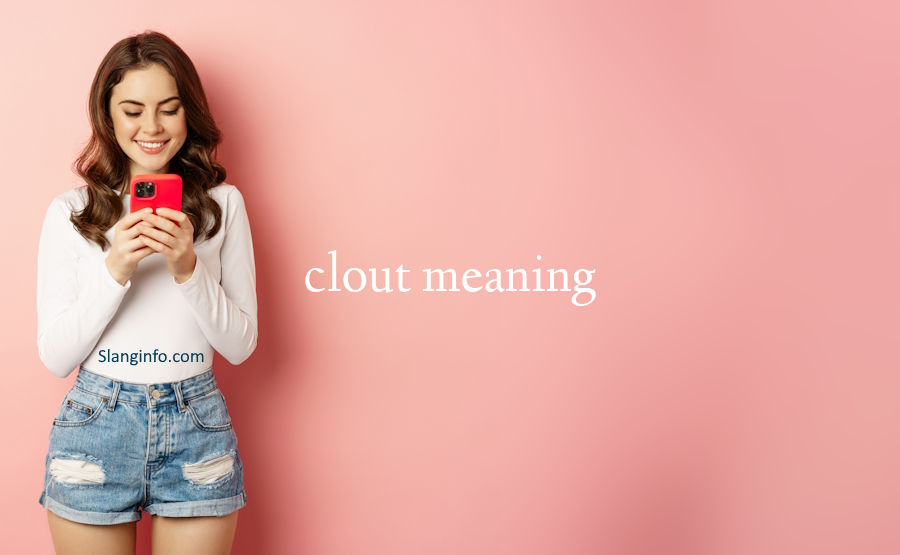Hey there, internet explorers and social media mavens! 👋 Ever heard someone say they’re “chasing clout” or that someone has “mad clout” and wondered what in the world they were talking about? Well, buckle up, because we’re about to dive deep into the world of clout and explore what it means in today’s digital age. 📱💻
| Key Takeaways |
|---|
| 1. Clout refers to influence, power, or social status |
| 2. The term has evolved from its traditional meaning to modern social media usage |
| 3. In social media, clout often relates to follower count and engagement |
| 4. “Clout chasing” is a phenomenon associated with seeking online fame |
Clout Meaning: What Does Clout Mean in Today’s Lingo?

What Does Clout Mean? 🤔
First things first, let’s break down what clout actually means. In simple terms, clout refers to influence, power, or social status. It’s like having a superpower that makes people listen to you and take you seriously. 🦸♀️🦸♂️
But here’s the thing: the meaning of clout has evolved over time. Back in the day, if someone said they had clout, they might have meant they had the power to get things done in politics or business. Nowadays, though, clout is all about your online presence and influence.
Think of it like this: if you’ve got a ton of followers on Instagram, Twitter, or TikTok, and people are constantly liking, commenting on, and sharing your posts, you’ve got clout. You’re basically the Beyoncé of the internet. 👑🐝
Also read: Fiending
Origins and Evolution of Clout 📚
Now, you might be wondering, “How did we get from clout meaning a blow or hit to it being all about social media influence?” Great question! Let’s take a little trip down memory lane.
Way back in the day, clout was used to describe a heavy blow or the power behind a hit. Over time, it evolved to mean influence or power in a more general sense, especially in political or social contexts.
Fast forward to the rise of social media, and clout took on a whole new meaning. Suddenly, it wasn’t just about who you knew or what you could do – it was about how many people knew you and how much influence you had online.
It’s like the old saying, “It’s not what you know, it’s who you know,” got a digital makeover. Now it’s more like, “It’s not who you know, it’s how many people know you online.” 🌐
Also read: Hustle
Clout in Social Media 📱

So, what does clout look like in the wild world of social media? It’s all about the numbers, baby. 🔢
On platforms like Instagram, Twitter, and TikTok, clout is often measured by:
- Follower count: The more followers you have, the more clout you’re likely to have.
- Engagement: If your posts are racking up likes, comments, and shares, you’re probably swimming in clout.
- Verified status: That little blue checkmark next to your name? Yep, that’s a clout indicator.
But it’s not just about the raw numbers – it’s also about who’s paying attention to you. If you’ve got a bunch of influential people following you and engaging with your content, that’s some serious clout right there.
Some people with major clout on social media are called “influencers.” These are the folks who have built up such a strong online presence that they can actually influence the behavior and decisions of their followers. 🤯
Think about it: if your favorite Instagram star posts about a new product they love, you might be more likely to check it out yourself. That’s the power of clout in action.
The Phenomenon of Clout Chasing 🏃♂️
Now, with all this talk of clout and influence, you might be thinking, “Sign me up! How do I get me some of that clout?” 🙋♀️🙋♂️
Enter the phenomenon of “clout chasing.” This is when people do things specifically to try to gain clout and go viral online. It’s like the internet version of doing crazy stunts to get famous.
Some examples of clout chasing behavior might include:
- Posting controversial or shocking content just to get a reaction
- Starting drama or feuds with other people online to get attention
- Jumping on the latest meme or trend, even if it doesn’t make sense for your brand
- Buying fake followers or engagement to make yourself look more popular
While clout chasing might seem like a tempting shortcut to internet fame, it can actually backfire big time. People can usually tell when someone is being inauthentic or just doing things for attention, and it can make them lose respect for that person.
Plus, if you’re so focused on chasing clout, you might lose sight of what really matters – creating content that genuinely resonates with people and building authentic connections with your audience.
Also read: Side hustle
The Impact of Clout on Modern Culture 🌍
Whether you’re a fan of the term or not, there’s no denying that clout has had a major impact on modern culture. It’s changed the way we think about influence, success, and even fame itself.
For one thing, clout has become a major factor in marketing and advertising. Brands are always on the lookout for influencers with clout to promote their products or services. Why? Because they know that if someone with clout endorses something, their followers are more likely to check it out.
It’s like having a celebrity endorse your product, but instead of a movie star or athlete, it’s an Instagram model or YouTube gamer. 🎥🎮
Clout can also have a big impact on your personal brand and career opportunities. If you’ve got a strong online presence and a lot of clout, you might be more likely to get hired for certain jobs or be seen as an expert in your field.
But it’s not all sunshine and rainbows in the world of clout. There’s also a darker side to the pursuit of online influence.
Also read: Flex
Criticisms and Controversies 🚫
For all the hype around clout, there are also plenty of criticisms and controversies surrounding it. Some people argue that clout is overrated and that online influence doesn’t necessarily translate to real-world success or impact.
There are also concerns about the authenticity of people who are chasing clout. If someone is just doing things for attention or followers, can we really trust what they’re saying or promoting?
And then there’s the impact on mental health. The pressure to constantly create content, keep up with trends, and maintain a perfect online image can be exhausting and even damaging for some people. It’s easy to get caught up in the numbers game and lose sight of what really matters.
How to Build Genuine Clout 🌱
So, with all that in mind, how can you build clout in a way that feels authentic and meaningful? Here are a few tips:
- Focus on creating quality content: Instead of just chasing trends or trying to go viral, focus on creating content that genuinely resonates with your audience and provides value.
- Be authentic: Don’t try to be someone you’re not or do things just for attention. Be true to yourself and your values, and your clout will feel more genuine.
- Engage with your audience: Building clout isn’t just about numbers – it’s about building real relationships with your followers. Take the time to respond to comments, ask for feedback, and create a sense of community around your content.
- Collaborate with others: Teaming up with other creators or influencers can be a great way to build clout in a way that feels authentic and mutually beneficial.
- Use your clout for good: If you do build up a strong online presence, consider using your platform to make a positive impact or raise awareness for causes you care about.
Remember, building genuine clout takes time and effort – there’s no overnight success formula. But if you stay true to yourself and focus on creating content that matters, you’ll be well on your way.
Conclusion 💡
We’ve covered a lot of ground in this deep dive into the world of clout. We’ve explored what it means, where it came from, and how it’s impacting modern culture in both positive and negative ways.
At the end of the day, clout is a powerful force in today’s digital age. It can open doors, build careers, and even change lives. But it’s not the be-all and end-all of success or happiness.
As you navigate the world of social media and online influence, remember to stay true to yourself, focus on what really matters, and use your clout for good. Because in the end, the most meaningful kind of influence is the kind that makes a real difference in people’s lives. 💖
FAQs ❓
Q: Can anyone have clout?
A: In theory, yes! Clout is all about influence and impact, and anyone can build that up with time and effort.
Q: Is clout the same as fame?
A: Not necessarily. Fame is more about being widely known, while clout is more about having influence and power within a specific community or niche.
Q: How do you measure clout?
A: Clout can be measured in different ways depending on the platform, but common metrics include follower count, engagement rates, and reach.
Q: Is clout a bad thing?
A: Clout itself isn’t inherently good or bad – it’s all about how you use it. If you’re using your influence to make a positive impact or create meaningful content, that’s a good thing. But if you’re just chasing numbers or doing things for attention, it can be problematic.
Q: Can you lose clout?
A: Absolutely. Just like you can gain clout, you can also lose it if you’re not careful. If you do something controversial or inauthentic, or if you stop creating quality content, your clout can definitely take a hit.
So there you have it – the ultimate guide to clout in the digital age. Whether you’re a social media maven or just a casual scroller, understanding the power and pitfalls of online influence is key to navigating today’s world. So go forth and clout responsibly, my friends! 🙌
Slang Cheat Sheet:







